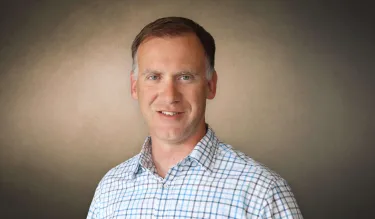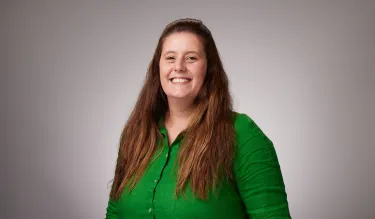Critical Care Specialist Reimagines Health Care in a Post-Pandemic Era
Dr. Ayan Sen attended The Innovative Health Care Leader program as the COVID-19 crisis began to wane. His priority: Rebuild public trust in the health care system and transform patient care.
May 28, 2024

Growing up in India in a family of physicians, Ayan Sen, MD, was drawn to a career in medicine. “I was inspired by my granddad, who was a surgeon and chief medical officer of a hospital,” Ayan shares. “I was a keen grandson watching him focus on the patient as a human, as an individual through his stories.”
He describes his grandfather as a humanist with a holistic approach to patient care. That philosophy remained foremost for him through training in India, the United Kingdom, and the U.S., and, with his family’s support, continues to guide Ayan’s work today as Department Chair in Critical Care Medicine and ICU Medical Director. “A good physician doesn’t just take care of patients’ medical needs,” he says, “but connects with people and touches their lives when they’re most vulnerable.”
Ayan also serves as Chair of Resuscitation and Medical Emergency Response at his metropolitan hospital. His skills were certainly put to the test as the COVID-19 pandemic put unprecedented strain on medical systems and health care providers.
“We had some great outcomes for our patients,” he reflects. “At the same time, we went through a lot of trials and tribulations. And the most important challenge to deal with for a health care team for a protracted pandemic was the erosion of public trust. We went from being heroes in health care to pariahs because society lost its trust with burnout, mixed messages from health care leaders and public servants, and the prolonged nature of the public health emergency itself.”
That change in community perceptions took a great toll on the providers themselves, who, dealing with their own moral distress, turned to health care leaders like Ayan for guidance and support. It was this pivotal time in health care that led Ayan, a lifelong learner, to Stanford Graduate School of Business (GSB).
“I was emerging from leading the critical care pandemic response with my team, which had borne the brunt of the worst disaster of our times,” he shares. In addition, his institution post-pandemic was in the midst of a significant expansion initiative, doubling the number of staff physicians and advanced practice providers, while adding around 100 hospital and ICU beds, to serve an increased number of patients in need of serious and complex care.
“I needed a program to help me be an innovative health care leader with a focus on team building, innovation, and personal growth,” he says.
Stanford Executive Education’s The Innovative Health Care Leader: From Design Thinking to Personal Leadership program — a collaboration between Stanford GSB and Stanford School of Medicine — offered the frameworks and tools Ayan needed to help lead his organization into the future.
Skills for Health Care Innovation
Ayan knew the one-week, on-campus program was “led by renowned people in the worlds of medicine, business, and design thinking.” The Innovative Health Care Leader curriculum combines design thinking for health care innovation with the use of technology to improve quality and safety in patient care. It also covers personal growth and leadership development, as well as scaling excellence.
“One of the big aspects of design thinking that I learned was to ensure you provide all stakeholders with a little bit of creative license when looking at change,” Ayan says. “The design thinking framework gave me a great template to say, ‘Let’s bring everybody together and think creatively.’”
While in the program, sessions on scaling up excellence helped him learn how to share constructive beliefs, behaviors, and practices with other caregivers — important for staff morale and retention in the pandemic era.
“Scaling up excellence is really what we can do as mentors for our new learners and our peers,” says Ayan, who also holds the rank of associate professor within the academic medical center and is board-certified in five specialties/subspecialties.
“You make a difference,” Ayan says of all caregivers, offering support as the U.S. faces a critical shortage of nurses, physicians, and other health care professionals. “You are all valuable because you impact people’s lives, and we need you, more than ever, in health care.”
Ayan enjoyed learning with other health care providers from around the world, sharing ideas on how to move patient-centered care forward. “The sessions let participants engage in collaborative inquiry to find out where opportunities lie, and to get feedback from each other.”
Leading Health Care Reform
Ayan continues to draw on what he learned from The Innovative Health Care Leader program to transform health care at his institution.
“Building high-performance teams is a big part of my job and my personal interest,” Ayan says. “How do you learn negotiation skills and the human factors and systems issues in health care? How do you learn conflict management? How do you synergize the opportunities in digital health along with the core principles of bedside medicine and the needs of the patient being first? Those are important key learnings from the program. Because ultimately, health care is a team sport.”
Ayan says he’s applied what he learned about design thinking to bring stakeholders and teams together for his hospital’s expansion initiative. “The needs of the patient come first. We try to live that every single day and to incorporate this key value into the mission and vision of our organization. Design thinking really helped me navigate that. I still use it, as change and growth are a constant.”
To other health care leaders considering the program, Ayan offers this advice: “This is a great program that enables us to understand not just the challenges, but the opportunities that lie in front of us. The curriculum is fantastic. The pace is excellent, and it gives us introspection to where we are now in the health care industry. I would say it gives us hope for the future.”
Explore More Participant Spotlights
Breaking New Ground for the Future of Farming

Executive Lays the Groundwork to Becoming a Chief Operating Officer

HR Leader Brings Innovative Mindset to Established Network of Animal Hospitals
